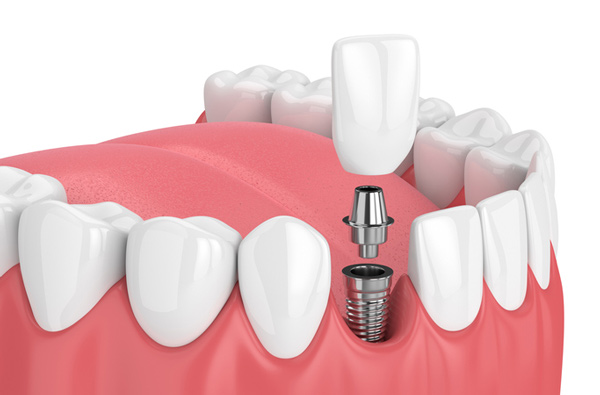Dental Implants
New York, NY 10022
Dental Implants provided by Rihito Matsui DDS in New York, NY at Matsui Dental
 Missing teeth can lead to serious complications later down the road, such as a misaligned bite, crooked teeth, and bone deterioration. Luckily, patients have more tooth replacement options than ever before. At Matsui Dental we specialize in several full-tooth restorations, including dental implants. Dental implants have revolutionized the way we treat tooth loss. Thanks to their many benefits, it's no wonder that implants have become the industry standard for tooth replacement. An implant-supported restoration is the next best thing to your natural teeth!
Missing teeth can lead to serious complications later down the road, such as a misaligned bite, crooked teeth, and bone deterioration. Luckily, patients have more tooth replacement options than ever before. At Matsui Dental we specialize in several full-tooth restorations, including dental implants. Dental implants have revolutionized the way we treat tooth loss. Thanks to their many benefits, it's no wonder that implants have become the industry standard for tooth replacement. An implant-supported restoration is the next best thing to your natural teeth! What Is a Dental Implant?
A dental implant is a small titanium post that we surgically embed below the gum tissue and into the jawbone. The implant post serves as the root component of a prosthesis. After a brief healing period the post is attached to an abutment, or support structure, that links the implant to the restoration. Thanks to technological advancements implants can be used to support a single crown, a fixed bridge, or even a full-arch restoration!
The Dental Implant Process
The dental implant process begins with a consultation appointment. During your consultation, Rihito Matsui DDS will perform a series of diagnostic tests to ensure you are a suitable candidate for implant treatment. Most patients healthy enough to undergo minor surgery will qualify. Implants do require a significant amount of bone in the jaw. If your bone is too soft or too thin, we may recommend a bone graft.
Once we determine you are a suitable candidate for dental implants, we will develop an appropriate treatment plan. Most implant procedures are broken up into two surgeries. During the first surgery, we will make a minor incision in the gum tissue to expose the underlying bone. Next, we will place the implant deep within the jawbone.
Over the next several months, the implant and your jawbone will fuse through the process of osseointegration. Osseointegration is largely responsible for the many benefits of dental implants, mimicking the natural relationship between tooth root and socket.
Once osseointegration is complete, we will schedule the second surgery to place the abutment. After the abutment is in place, we take an impression of the area. The impression will be used by our laboratory technicians to fabricate your final restoration. Once your restoration is ready, we will permanently attach it to the implant post.
Benefits of Dental Implants
| • | Unmatched aesthetics. Our restorations are made from aesthetically-pleasing materials, such as porcelain or zirconia. These materials mimic the appearance of natural enamel. |
| • | Unmatched comfort. Because your implant becomes a part of you, you will not experience any of the discomforts typically associated with removable restorations. |
| • | Unmatched convenience. Implants are permanently fixed to the jawbone and do not require any special attention. Your restoration will look, feel, and function just like your natural teeth. You may even forget you have a restoration. |
| • | Unmatched durability. Under the proper care and maintenance, a dental implant will last for many decades. In some cases, it may even last a lifetime! You will be able to eat your favorite foods with confidence and comfort! |
| • | Better oral health. The implant post provides physical stimulation to the jawbone, preventing future deterioration. Your restoration will also leave your remaining teeth unaffected. Other restorations can put healthy teeth at a greater risk for damage or decay. |
FAQs
What are dental implants?
Dental implants are artificial tooth roots made of titanium that are surgically placed into the jawbone to support replacement teeth, such as crowns, bridges, or dentures. They are designed to look, feel, and function like natural teeth, providing a long-term solution for individuals with missing teeth.
How do dental implants work?
Dental implants work by integrating with the jawbone through a process called osseointegration. Once the implant is placed in the jawbone, the bone gradually fuses with the implant, creating a strong and stable foundation for the replacement tooth. This process typically takes a few months, after which a custom-made crown is attached to the implant.
Who is a good candidate for dental implants?
A good candidate for dental implants is someone who has one or more missing teeth, has good overall health, and has sufficient jawbone density to support the implant. Additionally, candidates should have healthy gums and be committed to maintaining good oral hygiene. A thorough evaluation by a dentist or oral surgeon is necessary to determine if dental implants are the right option.
What is the procedure for getting dental implants?
The dental implant procedure typically involves several steps. First, a comprehensive examination and imaging are conducted to plan the implant placement. Next, the implant is surgically placed into the jawbone. After a healing period of a few months, during which osseointegration occurs, an abutment is attached to the implant. Finally, a custom-made crown is placed on the abutment to complete the restoration.
Are dental implants painful?
Most patients experience minimal discomfort during the dental implant procedure, as local anesthesia is used to numb the area. Post-operative pain and swelling can usually be managed with over-the-counter pain medications and ice packs. Many patients report that the discomfort is less than expected and similar to that of a tooth extraction.
How long do dental implants last?
Dental implants are designed to be a long-term solution for missing teeth and can last many years with proper care. While the crown attached to the implant may need to be replaced after 10-15 years due to normal wear and tear, the implant itself can last a lifetime if maintained with good oral hygiene and regular dental check-ups.
How much do dental implants cost?
The cost of dental implants can vary widely depending on several factors, including the number of implants needed, the type of restoration used, and the complexity of the procedure. It is best to schedule a consultation with a dentist to receive an accurate estimate based on your specific needs and treatment plan.
Do dental implants require special care?
Dental implants do not require special care beyond regular oral hygiene practices. It is important to brush and floss daily and visit the dentist for regular check-ups and cleanings. Avoiding habits like smoking and excessive consumption of sugary foods can also help maintain the health of your dental implants.
Can dental implants fail?
While dental implants have a high success rate, there is a small risk of failure. Factors such as poor oral hygiene, smoking, certain medical conditions, and insufficient bone density can contribute to implant failure. It is crucial to follow your dentist's instructions and maintain good oral hygiene to reduce the risk of complications.
Are dental implants covered by insurance?
Dental implant coverage varies by insurance plan. Some dental insurance plans may cover a portion of the cost, while others may not provide any coverage. It is advisable to check with your insurance provider to understand your specific plan's coverage for dental implants and discuss financing options with your dentist if needed.
Schedule a Consultation Appointment Today!
You, too, could experience the wonderful benefits of dental implants! Call 646-787-5155 to schedule your consultation appointment today!
